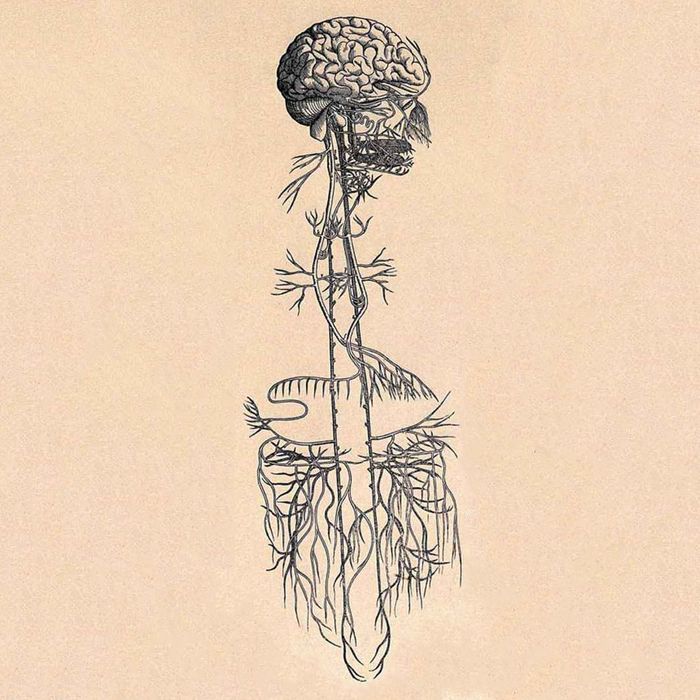It is undeniable that our minds and bodies are interconnected and interrelated. Research continues to show us that if we want to improve our mental health, focusing on our physical health will help support that process and vice versa. When we begin to understand that mental and physical health are interconnected systems that are deeply affected by one another, we can utilize that knowledge to find new ways to heal and thrive.
One of the best examples of this unshakeable mind/body connection is your vagus nerve.
The vagus nerve starts at the base of your head, extends down your spinal column, wraps through the body (hitting pretty much every organ along the way), and ends in the stomach. It helps you breathe, sneeze, taste, make memories, control your heart rate, and decompress after stressful situations.

It also plays a starring role in your body’s parasympathetic nervous system.
The parasympathetic nervous system is responsible for our bodily functions while we are at rest. It helps us to digest and metabolize our food, relax our brain and bodies, and recover after stress.
Its counterpart is the sympathetic nervous system. Responsible for alerting us to danger, the sympathetic nervous system kicks into gear when our brains perceive a threatening or stressful situation. It sends our bodies signals to prepare for danger — either in the form of fight, flight, or freeze.
Because of its relationship with virtually every part of the body, the vagus nerve is a powerful player in our mental and physical health.
Not only has there been a significant amount of research on the effects vagus nerve stimulation has on physical health issues but there have also been incredible accounts of people healing from depression, mood disorders, and trauma.
One of many studies done on depression found that adding vagus nerve stimulation (VNS) to conventional treatments for depression and anxiety significantly improved outcomes for patients as well as remission rates. Other studies done on trauma and post-traumatic stress disorder (PTSD) have found that VNS is incredibly beneficial for healing due to its relationship with the body’s parasympathetic nervous system.
Even for those without mental health issues, vagus nerve stimulation is an incredible tool we can use to quickly bounce back from stress, boost our mood and productivity, and improve our overall well-being.
There are many ways to stimulate the vagus nerve.
Some include getting a small bioelectric device inserted under your skin. There are also special non-invasive devices you can buy that will stimulate the vagus nerve for you. If you’re not into the idea of getting microchipped or buying fancy gadgets, have no fear. There are plenty of simple things you can do on your own to experience the powerful benefits of vagus nerve stimulation.
1. Slow, deep breathing
Deep and slow belly breaths (or diaphragmatic breathing) is where it’s at. When you breathe slowly and deeply, the vagus nerve is stimulated and immediately starts sending signals to the body to relax.
Action Tip: Try breathing in for five slow counts and out for five a few times, feeling your belly rise and fall with each breath. Then begin extending the exhale by a beat. Then another beat. See how long you can extend it for. The extended exhale technique is one of the easiest and most direct ways to fire up the vagus nerve.
2. Singing or humming
Your vagus nerve hits almost every organ in the body, and your vocal cords are no exception. The sustained vibrations that happen in the vocal cords when you sing or hum activates the vagus nerve. Even if you feel uncomfortable singing or humming a tune, you can still activate your vocal cords through a simple breathing technique.
Action Tip: Take a deep breath in through your nose. As you exhale, making a humming sound until you run out of air. Do that twice more. Don’t worry about how the humming sounds, just focus on where you can feel it. After you’re done, sit in stillness with your breath and notice how you feel.
3. Cold Exposure
Researchers have found that exposing yourself to cold on a regular basis can lower your sympathetic “fight or flight” response and increase parasympathetic “rest and digest” activity through the vagus nerve. For those of us not able or willing to frolic in frigid temps, there are a few alternatives to help expose you to the cold in order to increase vagal tone:
Action Tip: Try splashing your face with cold water twice a day. If you’re feeling up to it, spend the last 30 seconds of your shower in cold water (or as cold as you can stand it).
4. Meditation
Get your “om” on – your vagus nerve will thank you. Meditation has a wide range of benefits including decreased stress, improved sleep, and better overall health. When you meditate, it stimulates the vagus nerve, sending the mind into rest and recharge mode, which produces the calming effects you feel in both your mind and body.
Action Tip: Try this 1-minute body scan:
Take a deep, conscious breath in through your nose, feeling the air travel to your lower belly. Exhale out through your mouth. Continuing to breathe through your nose, into your lower belly, and out again. Starting at the top of the head, focus your attention on one body part at a time. Notice your head. Scan down and notice your face. Notice your neck. Your shoulders. Down your arms to your hands and fingers. Scan down through your chest. Notice your heart beating. Scan down through your torso. Down to your lower belly. Notice your hips. The tops of your thighs. Down to your knees. Your lower legs, ankles, and feet.
5. Laughing
Psychologist William James once said, “We don’t laugh because we are happy, we are happy because we laugh.” Laughter is deeply rooted within our nervous system. There is even something called laugh therapy that people swear by and it’s backed up by a mountain of evidence. Even if you aren’t in the mood for a giggle, try faking it as studies have shown that fake laughter stimulates the vagus nerve too.
Action Tip: Try fake-laughing for a minute. It may come out forced and awkward-sounding at first, but if you stick with it, that laughing may become genuine and you’ll find yourself feeling more uplifted.
At the end of the day, there is a sense of empowerment that comes when you begin to understand what exactly is happening inside you and why. Knowledge is power. When we have even just a bit of clarity behind how our minds and bodies work, we can respond in new ways to how we’re feeling and do so with empowered compassion. So the next time you’re feeling overwhelmed, burnt out, anxious, depressed, etc. try one of the above tips. Your vagus nerve will thank you.
Getty image by FG Trade

